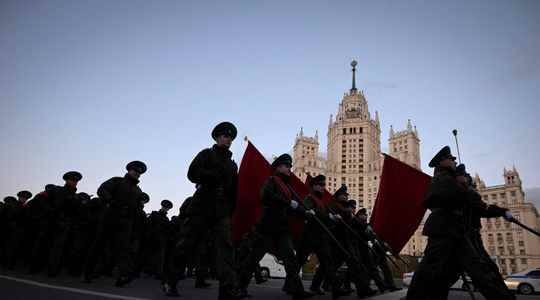Two ceremonies, two atmospheres. This Monday, May 9, Russia commemorates the “Day of Victory” over Nazi Germany, to the sound of tanks and the boots of its soldiers parading in Moscow. May 9 also marks Europe Day, a celebration of European unity in the twenty-seven Member States, on this anniversary of the Schuman Declaration of 1950.
In Moscow as in Strasbourg, the speeches of two men are particularly awaited: Vladimir Putin, who should increase his warlike rhetoric against Ukraine by a notch, and Emmanuel Macron, just re-elected and responsible for drawing the contours of the European Union in the coming years. “The French president should take the opportunity to oppose May 9 in Strasbourg to May 9 in Moscow, believes Sébastien Maillard, director of the Jacques Delors Institute. The contrast is striking between Putin, who exploits the memory of the Great Patriotic War for its own current war and, conversely, the great European peace celebrated in Strasbourg. This is the raison d’être of the European project and the feeling of belonging to the European Union.”
Europe’s major projects: energy, defence, enlargement
Beyond the symbol, Emmanuel Macron comes to speak before the MEPs in a very supervised format, in theory limited to fifteen minutes, and as head of state of the country which chairs the Council of the EU. If the French president should not repeat his founding speech from the Sorbonne in 2017, he could outline the major European projects: energy independence, technological sovereignty, common defense and enlargement of the Union.
This day also marks the end of the Conference on the Future of Europe, a gigantic consultation of European citizens carried out over a year. The result is 325 concrete proposals, formulated by the Europeans themselves. The Parliament of Strasbourg has already taken up their conclusions to ask for more democracy within the European institutions and this unprecedented democratic exercise could serve as a basis for changes in Europe.
“For Europe to move, three things must be brought together: ideas, circumstances, and politicians to carry them, continues Sébastien Maillard. The war in Ukraine and the pandemic have brought the circumstances; the Conference on the he future of Europe gives ideas; and the re-election of Emmanuel Macron, alongside Olaf Scholz, Mario Draghi and Mark Rutte, gives a pro-European dynamic to the continent. The speech of May 9 can make this breath felt .”
Macron and Scholz, soon together in kyiv?
Another symbol of this day, Emmanuel Macron will fly to Berlin at the end of his speech before the European Parliament, for his first trip abroad as re-elected president. A way of recalling the existential importance of the Franco-German axis in the European project, while war is brewing again at the borders of the EU.
Ukraine will also be central during the meeting with Olaf Scholz. The French president resumed dialogue with Vladimir Putin with a call lasting more than 2 hours on Tuesday, May 3, after a long diplomatic interruption due, in part, to the French presidential election. The idea of a Franco-German trip to kyiv has been floating around since the re-election of Emmanuel Macron. But Berlin, like Paris, believes that they need a concrete message to bring to President Zelensky, on arms deliveries, the embargo on Russian hydrocarbons or… Ukraine’s accession to the European Union.
